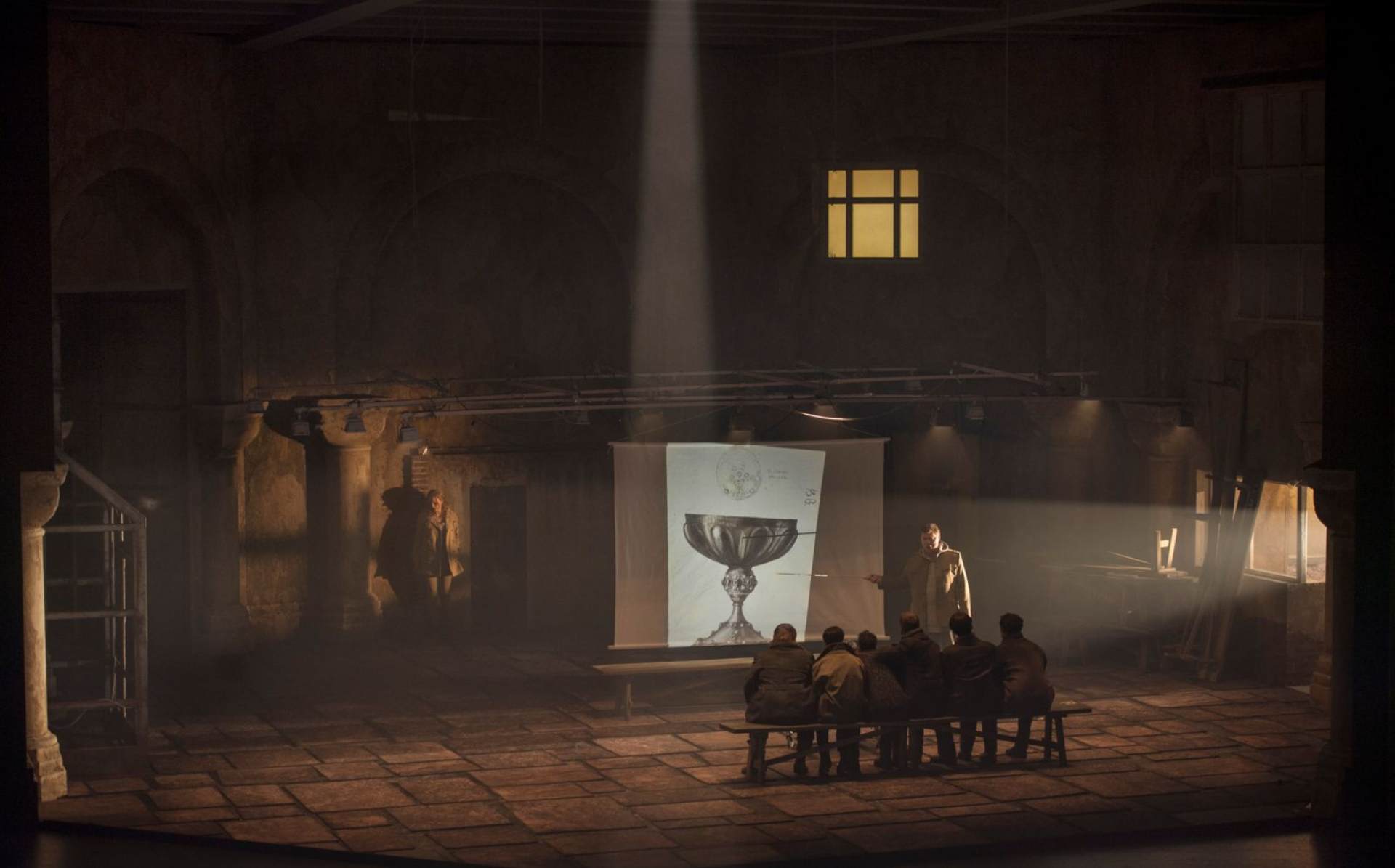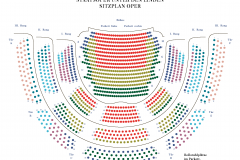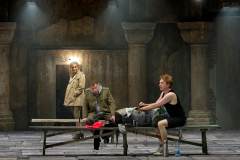Parsifal
April 2025 | ||||||
|---|---|---|---|---|---|---|
Mo | Tu | We | Th | Fr | Sa | Su |
BÜHNENWEIHFESTSPIEL (»A FESTIVAL PLAY FOR THE CONSECRATION OF THE STAGE«) IN THREE ACTS (1882)
MUSIC AND TEXT BY Richard Wagner
The Grail Knights are a brotherhood sworn to strict chastity. They guard two relics that promise salvation and eternal life: the Holy Grail and the Holy Spear. However, after their king Amfortas breaks his vow of chastity with the mysterious Kundry, the spear falls into the hands of Klingsor, a former knight expelled from the order, who uses it to inflict an unhealable wound on the king. According to prophecy, only a »pure fool made wise by compassion« can save Amfortas from eternal agony and retrieve the spear. Gurnemanz, the brotherhood’s spiritual leader, believes that the naive Parsifal is this new saviour. But Parsifal has a long path of enlightenment to tread first …
Richard Wagner wrote »Parsifal« towards the end of his life. It combines Christian myth with Buddhist elements and ideas from the philosophy of Schopenhauer. He saw the work as an embodiment of his idea of art-as-religion. With powerful, soul-stirring music, it ultimately presents a religious ideology that preaches the overcoming of sin and sensuousness through insight, compassion and rejection of love, which is portrayed as reprehensible.
Synopsis
Act 1
Prelude to act 1
Musical introduction to the work with a duration of c. 12–16 minutes.
Scene 1
In a forest near the seat of the Grail and its knights, Gurnemanz, an elder knight of the Grail, wakes his young squires and leads them in morning prayer ("He! Ho! Waldhüter ihr"). Their king, Amfortas, has been stabbed by the Holy Spear, once bequeathed to him into his guardianship, and the wound will not heal.
Kundry arrives in a frenzy, with soothing balsam from Arabia. The squires eye Kundry with mistrust and question her. They believe Kundry to be an evil pagan witch. Gurnemanz restrains them and defends her. He relates history of Amfortas and the spear; it was stolen from him by the failed knight Klingsor.
Gurnemanz's squires ask how it is that he knew Klingsor. Gurnemanz tells them that Klingsor was once a respected knight, but, unable to cleanse himself of sin, castrated himself in an effort to attain purity, but instead became an evil monstrosity.
Parsifal enters, carrying a swan which he has killed. Shocked, Gurnemanz speaks sternly to the lad, saying that this land is a holy place, not to be defiled by murder. Remorsefully the young man breaks his bow in agitation and casts it aside. Kundry tells him that she has seen that his mother has died. Parsifal, who cannot remember much of his past, is crestfallen.
Gurnemanz wonders if Parsifal might be the predicted "pure fool"; he invites Parsifal to witness the Ceremony of the Uncovering of the Grail, which renews the knights' immortality.
Orchestral interlude – Verwandlungsmusik (Transformation music)
Scene 2
The voice of the retired king Titurel resounds from a vaulted crypt in the background, demanding that his son Amfortas uncover the Grail and serve his kingly office ("Mein Sohn Amfortas, bist du am Amt?"). Only through the immortality-conferring power of the sacred chalice and the Saviour's blood contained therein may Titurel himself, now aged and very feeble, live on. Amfortas is overcome with shame and suffering ("Wehvolles Erbe, dem ich verfallen"). He, the chosen guardian of the holiest of relics, has succumbed to sin and lost the Holy Spear, suffering an ever-bleeding wound in the process; uncovering the Grail causes him great pain. The young man appears to suffer with him, clutching convulsively at his heart. The knights and Titurel urge Amfortas to reveal the Grail ("Enthüllet den Gral!"), and he finally does. The dark hall is illuminated by its radiant light and the round table of the knights is miraculously filled with wine and bread. Slowly all the knights and squires disappear, leaving Gurnemanz and the youth alone. Gurnemanz asks the youth if he has understood what he has seen. As the boy is unable to answer the question, Gurnemanz dismisses him as just an ordinary fool after all and angrily exiles him from the realm with a warning to let the swans in the Grail Kingdom live in peace.
Act 2
Prelude to act 2 – Klingsors Zauberschloss (Klingsor's Magic Castle)
Musical introduction of c. 2–3 minutes.
Scene 1
Klingsor's castle and enchanted garden. Waking her from her sleep, Klingsor conjures up Kundry, now transformed into an incredibly alluring woman. He calls her by many names: First Sorceress (Urteufelin), Hell's Rose (Höllenrose), Herodias, Gundryggia and, lastly, Kundry. She mocks his self-castrated condition but cannot resist his power. He resolves to send her to seduce Parsifal and ruin him as she ruined Amfortas before.
Scene 2
The youth walks into a wondrous garden, surrounded by beautiful and seductive flowermaidens. They call to him and entwine themselves about him while chiding him for wounding their lovers ("Komm, komm, holder Knabe!"), yet the boy in his childlike innocent naïveté doesn't comprehend their temptations and shows only little interest in them. The flowermaidens soon fight and bicker among themselves to win his devotion, to the point that he is about to flee, but a different voice suddenly calls out "Parsifal!". The youth finally recalls this name is what his mother called him when she appeared in his dreams. The flowermaidens back away from him and call him a fool as they leave him and Kundry alone.
Parsifal wonders if the whole Garden is but a dream and asks how it is that Kundry knows his name. Kundry tells him she learned it from his mother ("Ich sah das Kind an seiner Mutter Brust"), who had loved him and tried to shield him from his father's fate, the mother he had abandoned and who had finally died of grief. She reveals many parts of Parsifal's history to him and he is stricken with remorse, blaming himself for his mother's death. Kundry tells him that this realization is a first sign of understanding and that, with a kiss, she can help him understand the love that had once united his parents, wanting thus to awake in Parsifal the first pangs of desire. However, as she kisses Parsifal, the youth suddenly recoils in pain and cries out Amfortas' name: having just felt for the first time material desire with Kundry's kiss, Parsifal finds himself in the same position in which Amfortas had been seduced and he feels the wounded king's pain and suffering of evil and sin burning in his own soul. Only now does Parsifal understand Amfortas' passion during the Grail Ceremony ("Amfortas! Die Wunde! Die Wunde!").
Furious that her ploy has failed, Kundry tells Parsifal that if he can feel compassion for Amfortas, then he should also be able to feel it for her. In a distant past, she saw the Redeemer and mockingly laughed at His pains in malice. As a punishment for this sin she has been cursed and bound by Klingsor and has fallen under his yoke. The curse condemns her to never be able to die and find peace and redemption. She cannot weep, only jeer diabolically. Longing for deliverance, she has been waiting for ages for a man to free her from her curse and yearns to once more meet the Saviour's forgiving gaze, but her search for her redeemer in the end only ever turns into a desire to find her salvation in earthly desire with those who fall for her charms. All her penitent endeavours eventually transform into a renewed life of sin and a continued unredeemed existence in bondage to Klingsor. When Parsifal still resists her, Kundry curses him through the power of her own accursed being to wander without ever finding the Kingdom of the Grail again, and finally calls on her master Klingsor to help her.
Klingsor appears on the castle rampart and hurls the Holy Spear at Parsifal to destroy him. He seizes the spear in his hand and makes with it the sign of the Cross, banishing Klingsor's dark sorcery. The whole castle with Klingsor himself suddenly sinks as if by terrible earthquake and the enchanted garden withers. As Parsifal leaves, he tells Kundry that she knows where she can find him.
Act 3
Prelude to act 3 – Parsifals Irrfahrt (Parsifal's Wandering)
Musical introduction of c. 4–6 minutes.
Scene 1
The scene takes place many years later. Gurnemanz is now aged and bent, living alone as a hermit. It is Good Friday. He hears moaning near his hut and finds Kundry lying unconscious in the brush, similarly as he had many years before ("Sie! Wieder da!"). He revives her using water from the Holy Spring, but she will only speak the word "serve" ("Dienen"). Looking into the forest, Gurnemanz sees a figure approaching, armed and in full armour. The stranger removes his helmet and Gurnemanz recognizes the lad who shot the swan; to his amazement the knight also bears the Holy Spear.
Kundry washes Parsifal's feet and Gurnemanz anoints him with water from the Holy Spring, recognizing him as the pure fool, now enlightened by compassion and freed from guilt through purifying suffering, and proclaims him the foretold new king of the knights of the Grail.
Parsifal looks about and comments on the beauty of the meadow. Gurnemanz explains that today is Good Friday, when all the world is purified and renewed.
A dark orchestral interlude leads into the solemn gathering of the knights.
Orchestral interlude – Verwandlungsmusik (Transformation music) – Titurels Totenfeier (Titurel's Funeral March)
Scene 2
Within the Castle of the Grail, Titurel's funeral is to take place. Mourning processions of knights bring the deceased Titurel in a coffin and the Grail in its shrine, as well as Amfortas on his litter, to the Grail hall ("Geleiten wir im bergenden Schrein"). The knights desperately urge Amfortas to keep his promise and at least once more, for the very last time uncover the Grail again, but Amfortas, in a frenzy, says he will never again show the Grail, as doing so would just prolong his unbearable torment. Instead, he commands the knights to kill him and end with his suffering also the shame he has brought on the brotherhood. At this moment, Parsifal appears and declares only one weapon can help here: only the same spear that inflicted the wound can now close it ("Nur eine Waffe taugt"). He touches Amfortas' side with the Holy Spear and both heals the wound and absolves him from sin. The spear, now reunited with the Holy Grail, starts to bleed with the same divine blood that is contained within the sacred chalice. Extolling the virtue of compassion and blessing Amfortas' suffering for making a pure fool knowing, Parsifal replaces Amfortas in his kingly office and orders to unveil the Grail, which is never to be hidden again. As the Grail glows ever brighter with light and a white dove descends from the top of the dome and hovers over Parsifal's head, a chorus mysticus of all the knights praises the miracle of salvation ("Höchsten Heiles Wunder!") and proclaims the redemption of the Redeemer ("Erlösung dem Erlöser!"). Kundry, also at the very last released from her curse and redeemed, slowly sinks lifeless to the ground with her gaze resting on Parsifal, who raises the Grail in blessing over the worshipping knighthood.
Program and cast
Duration: approx. 5:30 hrs including two intervals
Language: In German language with German and English surtitles
Recommended age: 14 years and older
CAST
MUSICAL DIRECTOR: Philippe Jordan
DIRECTOR, SET DESIGN: Dmitri Tcherniakov
COSTUMES: Elena Zaytseva
LIGHT: Gleb Filshtinsky
AMFORTAS: Lauri Vasar
GURNEMANZ: René Pape
PARSIFAL: Andreas Schager
KLINGSOR: Tómas Tómasson
KUNDRY: Elīna Garanča
TITUREL: Kurt Rydl
KNAPPEN: Maria Kokareva , Rebecka Wallroth , Florian Hoffmann , Andrés Moreno García
ERSTER GRALSRITTER: Johan Krogius
ZWEITER GRALSRITTER: Manuel Winckhler
BLUMENMÄDCHEN: Evelin Novak , Adriane Queiroz , Sandra Laagus , Sonja Herranen , Clara Nadeshdin , Natalia Skrycka
STIMME AUS DER HÖHE: Anna Kissjudit
STAATSOPERNCHOR
STAATSKAPELLE BERLIN
State Opera Unter den Linden
Staatsoper Unter den Linden is one of Berlin's most prestigious opera houses, with a rich history and significant cultural impact.
History:
The Staatsoper Unter den Linden was originally built between 1741 and 1743, under the direction of architect Georg Wenzeslaus von Knobelsdorff. It was commissioned by Frederick II of Prussia and was initially named the Königliche Oper (Royal Opera). The opera house has undergone several renovations and reconstructions, notably after World War II damage. It reopened in 1984, following a major renovation.
Construction:
The original design was characterized by its Baroque style, featuring an elegant façade and a grand entrance. The building was reconstructed in the 1950s and 1980s, maintaining its classical exterior while modernizing the interior. The façade features a classic portico with six Corinthian columns and a prominent central pediment.
Interior:
The interior is known for its opulent and classical design. The auditorium is renowned for its acoustics and grandeur, with luxurious velvet seats and elaborate decorations. The stage and seating areas have been updated to meet modern performance standards while preserving historical aesthetics.
Concerts and Performances:
The Staatsoper Unter den Linden hosts a variety of performances, including operas, orchestral concerts, and ballet. It is home to the Staatskapelle Berlin, one of Germany's leading orchestras. The opera house is celebrated for its high-quality productions and its role in Berlin’s vibrant cultural scene.
JOURNEY
The Staatsoper Unter den Linden has completely barrier-free access due to its excellent public transport connections.
ADDRESS: Unter den Linden 7; 10117 Berlin
SUBURBAN RAILWAY
S+U Friedrichstraße (S1, S2, S5, S7, S25, S75)
SUBWAY
Hausvogteiplatz (U2)
Museumsinsel (U5)
Stadtmitte (U2, U6)
Unter den Linden (U5, U6)
BUS
Staatsoper (100, 245, 300)
Unter den Linden/Friedrichstraße (100, 147, 245, 300, N6)
PARKING
Q-PARK parking garage Unter den Linden/Staatsoper
Bebelplatz, 10117 Berlin
There are five electric charging stations in the parking garage. Further information can be found here.
The underground car park on Bebelplatz offers disabled parking spaces and direct access to the opera house. On entering the car park between 5.30pm and 11.30pm, the maximum parking fee is €7. To use this tariff, enter your parking ticket in one of the pay machines and the message »Theatertarif« will appear on the display. Please note that it is not possible to use the tariff if you enter the car park before 5.30pm. so it will not be shown on the display. TIP: If you pay the theatre tariff at the pay machine before the event, you can avoid unnecessary waiting after the show.

 EN
EN DE
DE IT
IT FR
FR ES
ES RU
RU JP
JP RO
RO
 Seating plan
Seating plan 


